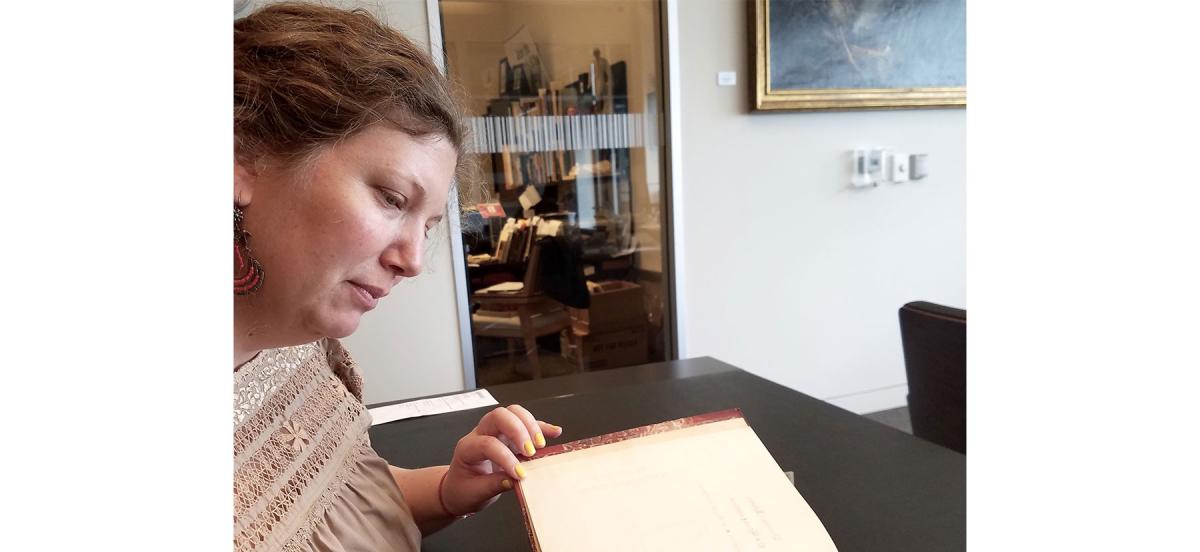“Caseidyneën Saën -- Learning Together” Wins Inaugural LASA Archives, Libraries and Digital Scholarship Award

Though the eight editors of Caseidynën Saën -- Learning Together, including Associate Professor of Linguistics Brook Lillehaugen (pictured here), are named as winners of the inaugural LASA Archives, Libraries and Digital Scholarship Award, the open-access e-book represents the work of "at least 30 individuals."
Details
Associate Professor of Linguistics Brook Lillehaugen and her collaborators were honored by the Latin American Studies Association for their volume of open access, pedagogical resources centered on Valley Zapotec-language materials created during the Mexican Colonial period.
Associate Professor of Linguistics Brook Lillehaugen’s work learning and documenting the Valley Zapotec language is not a solo endeavor. She collaborates with Zapotec speakers from Oaxaca, Mexico and diasporic communities throughout North America, other linguists, and digital scholarship experts who can help make their work accessible. So when her open access publication, Caseidyneën Saën -- Learning Together, was recently announced as the winner of the Latin American Studies Association’s first ever Archives, Libraries and Digital Scholarship Award, it was a team success.
“Learning that Caseidynën Saën -- Learning Together had been awarded this inaugural prize felt very validating,” said Lillehaugen. “There are many ways that our team's process and product fall outside of typical academic expectations, and we work this way intentionally. … Why create a book that Zapotec communities can never have access to? Why publish about Zapotec people without involving Zapotec people? Now that I have tenure, I want to use that privilege to make choices so that the scholarship I am involved in has the greatest potential impact for stakeholding community members. And for this project that meant a very collaborative, digital, and multilingual open access publication. Having academic peers see the value in this work as well has impact not only for this team and this project, but for others who are thinking of trying to do work in non-traditional ways.”
Caseidyneën Saën -- Learning Together is funded by Lillehaugen’s American Council of Learned Society’s Digital Extension Grant and is part of the larger ongoing Ticha Project, which gathers together for the first time a collection of endangered Zapotec language texts and makes them freely available online to high school and undergraduate learners across the English- and Spanish-reading world. So not only does this publication preserve these texts in a way that celebrates Zapotec knowledge, practices, and continued fight for survival and recognition, but it does so as a pedagogical tool that is meant to be used in classrooms to teach others.
“We are already seeing the impact these materials are having in Zapotec communities in Oaxaca and in diaspora,” said Lillehaugen. “The recognition is very meaningful, and we can understand it as a recognition of the value of this work in academic spaces, as well.”
The LASA award recognizes the publication’s eight editors: Lillehaugen, Haverford Libraries’ Mike Zarafonetis and Felipe H. Lopez, alum May Helena Plumb ’16, and Xóchitl Flores-Marcial, Moisés García Guzmán, George Aaron Broadwell, and Alejandra Dubcovsky. But the project has many additional contributors. So far, the collaborative seven-chapter e-book represents the work of “at least 30 individuals,” including five chapter authors (current students Eloise Kadlecek BMC ‘22 and Collin Kawan-Hemler ‘22 among them), 16 Zapotec community members who provided feedback, six student research assistants, and two professors who provided feedback on drafts of lessons used in their classrooms. However, five additional chapters are forthcoming this summer, which will involve additional collaborators and which will be workshopped with Zapotec community members through online Conversatorios.
A final version of Caseidyneën Saën -- Learning Together will be completed by November, just in time for the UN Decade of Indigenous Language, which starts in 2022, to kick off. Hopefully, the easily and freely available digital publication will make it possible for instructors in the U.S. and Mexico to incorporate Indigenous language in their classrooms with materials created with Zapotec community members.
“I get satisfaction from being involved in projects that are larger than I could do by myself,” said Lillehaugen. “In our team, we value the complementary expertise and experience that people bring to the table.”



